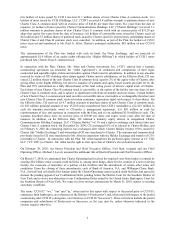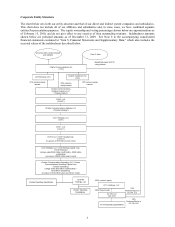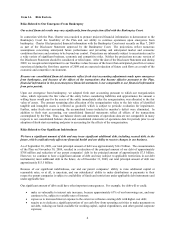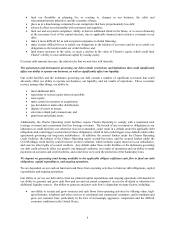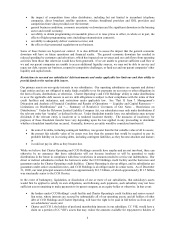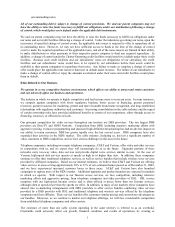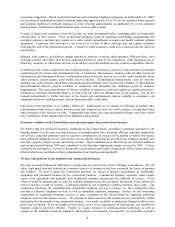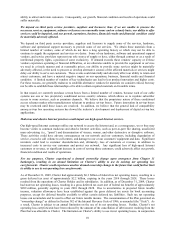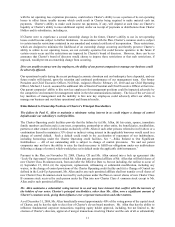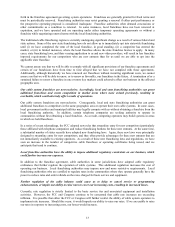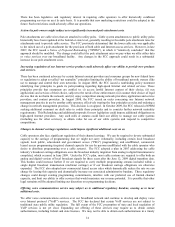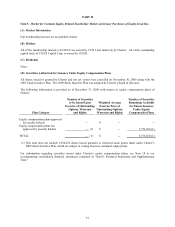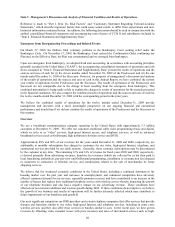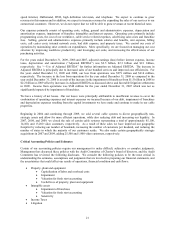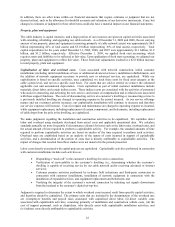Charter 2009 Annual Report Download - page 15
Download and view the complete annual report
Please find page 15 of the 2009 Charter annual report below. You can navigate through the pages in the report by either clicking on the pages listed below, or by using the keyword search tool below to find specific information within the annual report.12
all of Charter’ s assets. Charter’ s other principal stockholders have appointed members to Charter’ s board of
directors in accordance with the Plan, including Messrs. Zinterhofer and Glatt, who are employees of Apollo
Management, L.P., and Mr. Karsh, who was appointed by Oaktree Opportunities Investments, L.P. and is the
president of Oaktree Capital Management, L.P. Funds affiliated with AP Charter Holdings, L.P. beneficially hold
approximately 31% of the Class A common stock of Charter representing approximately 20% of the vote. Oaktree
Opportunities Investments, L.P. and certain affiliated funds beneficially hold approximately 18% of the Class A
common stock of Charter representing approximately 11% of the vote. Funds advised by Franklin Advisers, Inc.
beneficially hold approximately 19% of the Class A common stock of Charter representing approximately 12% of
the vote. Charter’ s principal stockholders may be able to exercise substantial influence over all matters requiring
stockholder approval, including the election of directors and approval of significant corporate action, such as
mergers and other business combination transactions should these stockholders retain a significant ownership
interest in us.
Charter’ s principal stockholders are not restricted from investing in, and have invested in, and engaged in, other
businesses involving or related to the operation of cable television systems, video programming, high-speed Internet
service, telephone or business and financial transactions conducted through broadband interactivity and Internet
services. The principal stockholders may also engage in other businesses that compete or may in the future compete
with us.
The principal stockholders’ substantial influence over our management and affairs could create conflicts of interest
if any of them were faced with decisions that could have different implications for them and us.
Risks Related to Regulatory and Legislative Matters
Our business is subject to extensive governmental legislation and regulation, which could adversely affect our
business.
Regulation of the cable industry has increased cable operators' operational and administrative expenses and limited
their revenues. Cable operators are subject to, among other things:
• rules governing the provision of cable equipment and compatibility with new digital technologies;
• rules and regulations relating to subscriber and employee privacy;
• limited rate regulation;
• rules governing the copyright royalties that must be paid for retransmitting broadcast signals;
• requirements governing when a cable system must carry a particular broadcast station and when it must
first obtain consent to carry a broadcast station;
• requirements governing the provision of channel capacity to unaffiliated commercial leased access
programmers;
• rules limiting our ability to enter into exclusive agreements with multiple dwelling unit complexes and
control our inside wiring;
• rules, regulations, and regulatory policies relating to provision of voice communications and high-speed
Internet service;
• rules for franchise renewals and transfers; and
• other requirements covering a variety of operational areas such as equal employment opportunity, technical
standards, and customer service requirements.
Additionally, many aspects of these regulations are currently the subject of judicial proceedings and administrative
or legislative proposals. There are also ongoing efforts to amend or expand the federal, state, and local regulation of
some of our cable systems, which may compound the regulatory risks we already face, and proposals that might
make it easier for our employees to unionize. Certain states and localities are considering new cable and
telecommunications taxes that could increase operating expenses.
Our cable system franchises are subject to non-renewal or termination. The failure to renew a franchise in one
or more key markets could adversely affect our business.
Our cable systems generally operate pursuant to franchises, permits, and similar authorizations issued by a state or
local governmental authority controlling the public rights-of-way. Many franchises establish comprehensive
facilities and service requirements, as well as specific customer service standards and monetary penalties for non-
compliance. In many cases, franchises are terminable if the franchisee fails to comply with significant provisions set


